How climate-smart farming has revolutionised women's lives in three counties

Avia Munyao from Ndiang’ui village, Mutomo Ward, Kitui South, watering her kitchen garden on July 4, 2023.
What you need to know:
- A four-year climate-smart agriculture project funded by Koica and implemented by UN Women has transformed the lives of women in Kitui, Laikipia, and West Pokot counties.
- Through training and technology like Zai-Pit and Gala goats, women like Avia Munyao have seen significant increases in income and empowerment.
- Women's groups have also thrived, with notable increases in savings and the adoption of climate-smart agriculture practices.
When an agriculture project kicked off in three counties in July 2020, little did people know the profound impact it would have on their lives. The initiative, which seemed like any other at its inception, would go on to transform the livelihoods of many in ways they could have never imagined. The four-year climate smart agriculture project started in Kitui, Laikipia and West-Pokot counties was initiated to economically empower women in these regions.
The Kenya Economic Empowerment of Women through Climate Smart Agriculture in arid and Semi-Arid areas (WEE-CSA) project, is funded by Korea International Cooperation Agency (Koica) and implemented by UN women, among other implementing partners.
A total of 2,346 women have benefited, leading to their massive economic transformation.
One such woman who has benefited from the project is Avia Munyao from Mutomo in Kitui. She has received training on climate-smart agriculture, enabling her to develop new farming techniques. After applying these techniques, she has recorded bumper harvests for numerous seasons, both for maize and green grams.
In an interview with nation.africa last year, Avia revealed that she made Sh702,000 after selling 65 bags of green grams in 2022. She utilised the money to expand her farming operations and pay school fees for her three children, one in university and two in college.
Last year, her green grams harvest yielded an impressive 80 bags, which she sold at Sh150 per kilogram, generating an income of more than Sh1 million. Avia attributes this bumper harvest to the Zai-Pit technology, introduced to her and other women in 2021, courtesy of the project.
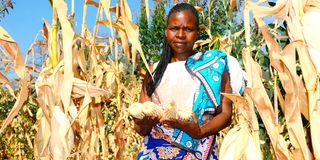
Avia is a happy farmer after getting a bumper harvest this season.
Zai-Pit, also known as planting pits, is a water-efficient technology used in arid and semi-arid areas to maximise water utilisation by crops. It creates a micro-environment that increases drought resistance and improves crop yields, making it well-suited for ASAL areas.
In addition to her successful crop farming, Avia keeps Gala goats, which were introduced through the project. This breed is adaptive to dry weather, making it ideal for the area. She started with four goats in 2021, and her herd has now grown to more than 80 goats.
The mother of three reveals that she recently sold eight goats at Sh12,000 each. "Gala goat farming has been a blessing. It is well-paying and does not require a lot of capital. It has empowered me and many other women here," she says.
Avia's story exemplifies the tangible impact of the project, which has not only boosted her income but has also empowered her and other women in the region through sustainable farming practices and livestock rearing.
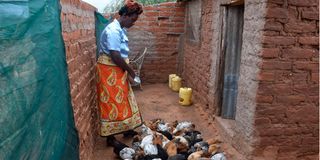
Purity Muema, a poultry farmer at Kamutei village in Kitui South feeding some of her chickens in her home on July 7, 2023.
Women groups have also immensely benefited from the project. One such group is the Katalwa Women Group in Katutu village, Kauwi Ward. Ida Muthui, the group's secretary, says the project was established to address the economic struggles faced by women in the area.
Ida tells nation.africa that they initially started with table banking and merry-go-rounds before transitioning to savings and later issuing soft loans to members. Group members have been beneficiaries of these soft loans, which they have used to venture into poultry keeping.
The women raise the chickens individually but sell them as a group to hotels in Nairobi at Sh350 per kilogram, Ida clarifies. "Many women in the group are housewives who now have their own money. They are assisting in taking care of their families," she says.
Ida adds that the poultry project has enabled the women to have their own income.
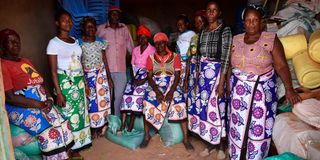
Some members of Kawelu Women Group at their store at Ndiang’ui village, Mutomo Ward, Kitui South on July 5, 2023. The women are beneficiaries of a four-year climate smart agriculture initiative.
"We were poor, but we are now empowered like men. The women in the group no longer need to depend on their husbands for anything. There is more peace and love at home as women are no longer persistently asking their men for money, which often brings conflicts," she adds.
Ida's sentiments are backed by the Rapid Assessment conducted in Kitui, Laikipia, and West Pokot Counties by UN Women and FAO, undertaken to evaluate the progress of the WEE-CSA project. The study, released by UN Women and FAO in Nairobi a fortnight ago, states that household income-related conflicts have reduced by 47 per cent, resulting in fewer households reporting disputes related to limited income, unequal income-earning opportunities, and traditional gender-related roles.
Read also: Farmers reap big from climate smart farming
Members of the Katalwa Women Group keep the Karli improved kienyeji chicken. They have learned how to care for the chickens, including vaccination. The women are leveraging the feed crusher and mixer donated through the project to venture into chicken feed manufacturing. They use green grams, sunflower, cowpeas, black beans, maize, and sardines (omena) to make the chicken mash.
They buy the chicken mash at Sh50 per kilogram, half the market price. Non-members of the group purchase it at Sh100 or Sh200, depending on the quantity. Every Thursday, each member brings 10 kilos of raw materials used to make the chicken feed from their farms.
The successful women highlighted here are just the tip of the iceberg when it comes to the many women from the three counties who have benefited from the project and have inspiring stories to tell.
The assessment findings reinforce the transformative impact of the project on these women's lives. It reveals that more than $685,000 has been generated as income, with a remarkable $200,000 being reinvested, accounting for 30 per cent of the earnings.
Notably, the largest portion of the income came from vegetable production, attributed to the high uptake of kitchen gardens. This approach aligns with women's mobility and ability to tend to these gardens while carrying out their other chores.
The primary objective of the project was to bolster the capacity of selected arid and semi-arid lands (ASAL) counties in adopting gender-responsive, climate-smart agricultural practices and climate change adaptation strategies, as well as strengthening women's ability to participate in these initiatives.
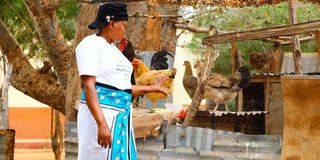
Rael Miwa, a poultry farmer at Kandae village in Kitui South shows some of her chickens in her home on July 5, 2023.
Furthermore, the assessment found that women's groups' savings have grown significantly, from $642 to $6,289, while the adoption of climate-smart agriculture technologies has risen to an impressive 85 per cent, up from 30 per cent four years ago. Consequently, women have experienced a notable increase in their income levels, coupled with improved food security for their households.
The women interviewed confirmed that they are now able to send their children to school with greater ease. More than 95 per cent of respondents affirmed that men now appreciate the women's contribution to household income. They have learned the value of crop production and are gradually transitioning from pure pastoralism to agro-pastoralism.
Additionally, over 80 per cent of respondents indicated that men now share women's responsibilities, signifying the project's impact on redistributing the care burden on women. The project has also led to a significant increase in the proportion of households reporting women's involvement in household decision-making, rising from 31 per cent in 2020 to 75 per cent currently.
Dr Stephen Mbaya, the County Executive Committee Member (CECM) in charge of agriculture in Kitui County, expresses the positive impact the project has had on women in the region. "We have witnessed the remarkable change that this project has brought to Kitui. To ensure its sustainability, the county has appointed a focal point who will ensure its continuity by, among other measures, connecting these farmers with extension officers," he says.
Ann Mutavati, the UN Women Representative to Kenya, is equally impressed with the initiative's success. "The project has empowered women to be involved in the decision-making process and has improved the income of families, while decreasing incidents of gender-based violence," she tells nation.africa. Mutavati emphasises the need to impart more skills to women, enabling them to engage in modern, climate-responsive agricultural practices.
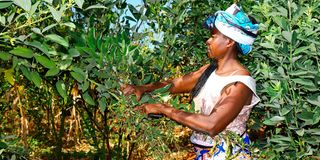
Avia Munyao from Ndiang’ui village, Mutomo Ward, Kitui South inspects her pigeon peas plant on her farm on July 5, 2023. She planted the pigeon peas using Zai-pit technology.
The positive outcomes of the project are evident, not only in the economic empowerment of women but also in the shifting dynamics within households and communities. As women gain financial independence and contribute to decision-making processes, their roles and status within their families and societies are elevated, fostering a more equitable and inclusive environment.
Carla Mucavi, the FAO County Director, shares that the climate-smart agriculture venture has created opportunities for women to improve their livelihoods. "The women have been taught new farming technologies, which have helped offer more job creation, provide access to technology, and digitise farming methods. This has allowed the women to increase the yield of their produce," says Ms. Mucavi.
Dr Jang Hee Im, the Koica Country Representative, acknowledges the significant potential of women, who account for more than 50 per cent of the country's population. Dr Jang notes that the project, which targets women in rural communities, has brought positive results across the three counties, as evidenced by the number of uplifted livelihoods in these communities.
“The project, which targets women in rural areas, has brought a lot of economic empowerment to them. It is our hope that the national and county governments will now upscale the project," he tells nation.africa. He adds that discussions about phase two of the project are ongoing, and reveals that some donors have expressed interest in upscaling the initiative.
Grace Wasike, a director at the State Department of Gender, is calling on Koica to spread the project to other counties to help more women benefit. "The Ministry in charge of gender is in the process of coming up with a women's economic empowerment policy, which has been informed by the climate-smart agriculture (WEE-CSA) project in the three counties," she says.
The project, which commenced in July 2020, has run for 48 months and is scheduled to end in June of this year. The positive impact it has had on women's empowerment and economic development in the targeted communities is evident, prompting calls for its expansion to other regions.



